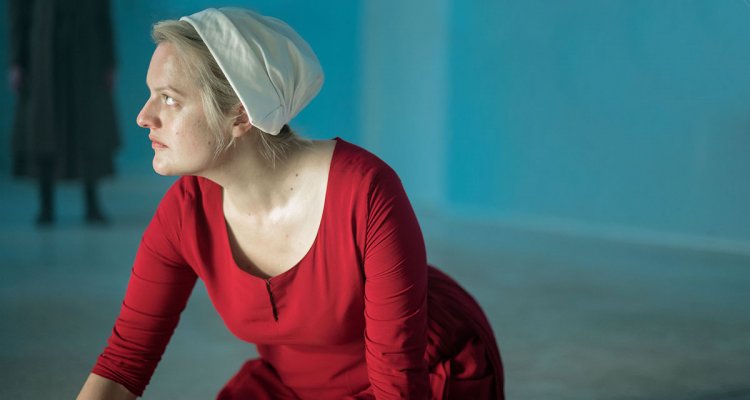Bruce Miller’s “The Handmaid’s Tale” has experienced a fascinating, stuttering evolution since its accolade-encrusted premiere in 2017. The first season, which took the words and visions of Margaret Atwood’s eponymous sci-fi novel and brought them to blue-toned light, was a runaway success. The second season, which premiered last year, went noticeably off-book as June (Elisabeth Moss) metamorphosed from an everywoman just trying to get by into a full-blown leader of the revolution. She was spunky. She was mouthy. She said “fuck” a lot. Far from the blank slate Atwood envisioned in her 1985 classic, June had become an uber-marketable feminist caricature for the #Resist generation. She was, for lack of a better word, annoying.
READ MORE: The 50 Most Anticipated TV Shows & Mini-Series Of 2019
From the battlefront of season three, I am dismayed to report that June is still annoying — gratingly so. From eye-roll-inducing lines like “Burn, motherfucker, burn,” to a literal shot of Moss smoking after a negotiation like a mob boss, June continues to be, as Atwood herself would say, an avatar of male fantasy within the female revolution. Except in this chapter, June has somehow convinced herself— despite a lot of in-show evidence to the contrary—that she is the person best equipped to catalyze the Gilead revolution. If you thought this show, after a few glimmering Emily-and-Moira-centric episodes in season two, may have been ready to sideline its worn-out protagonist, I have bad news. If you thought this show had long overplayed Moss looking grimly/triumphantly/feistily into the camera, I have even worse news.
READ MORE: The Best TV Shows & Mini-Series Of 2018
And yet, the third season of “The Handmaid’s Tale” marks some notable returns to form after season two. One of the strongest episodes of the series, “Useful,” directed by Amma Asante, comes three episodes into the new season. As June navigates her relationship with her sadistic new commander (Bradley Whitford) and Serena Joy (Yvonne Strahovski) contemplates her role in the femicidal society she built, their journeys eventually coalesce into a compassionate tet-a-tet. This tear-filled episode showcases the best of what “The Handmaid’s Tale” can do, beyond just sitting back and letting the incomparable Strahovski do her thing. At its best, this show tenderly portrays women’s relationships with each other, laying out how misogyny subtly unites us all. Episode three and some notable Canada-set scenes with Emily (Alexis Bledel) and her estranged wife, Sylvia (thank God for Clea Duvall), show us flashing glimpses of the ways in which this show can be smart and human and gentle.
READ MORE: 10 Shows to Watch in June: ‘Big Little Lies,’ ‘The Handmaid’s Tale’ & More
But bright flashes do not a shining star make, and ultimately I find myself nervously anticipating another clunkily-plotted season of this show that, if we’re all being honest with ourselves, should have been a one-off. From a perpetually flat June making breathtakingly stupid decisions to the ongoing cosmic joke that is this show’s writer/director gender breakdown—three of the six episodes available to critics were helmed by men— it’s hard to keep rooting for “The Handmaid’s Tale” when there are still so many better, female-led projects yet to be made.
Despite it all, I find myself begrudgingly intrigued for what the rest of season three has to offer. Between the show’s diverging paths, one toward more compassion and better characterization, the other toward even cheaper, exploitative thrills, it’s tempting to root for the former. But I won’t hold my breath. [C+]

